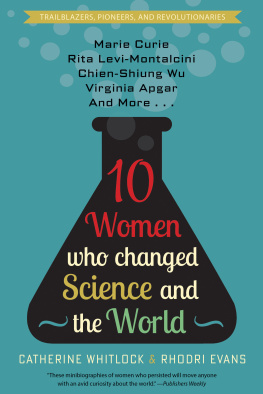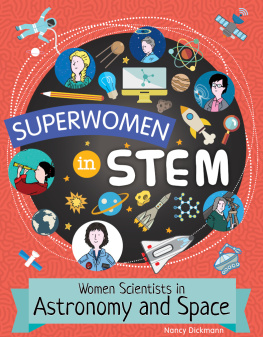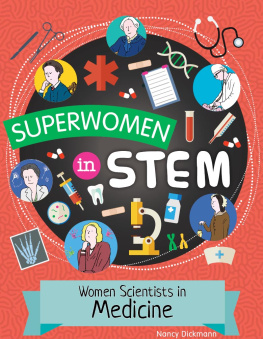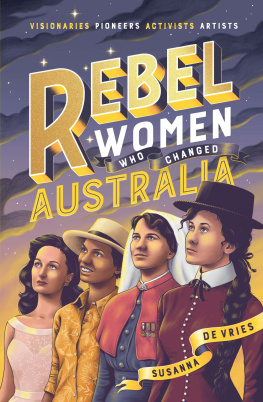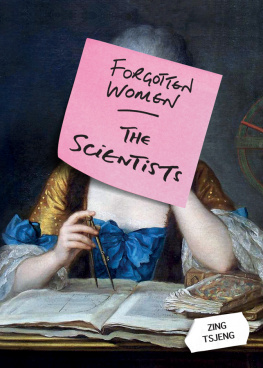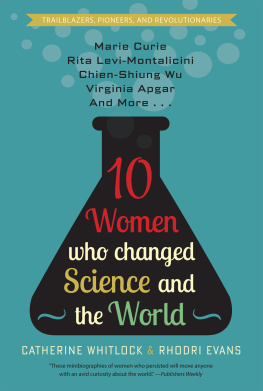Donald Athene - 10 Women Who Changed Science and the World
Here you can read online Donald Athene - 10 Women Who Changed Science and the World full text of the book (entire story) in english for free. Download pdf and epub, get meaning, cover and reviews about this ebook. year: 2019, publisher: Diversion Books;Ingram Pub Services, genre: Non-fiction. Description of the work, (preface) as well as reviews are available. Best literature library LitArk.com created for fans of good reading and offers a wide selection of genres:
Romance novel
Science fiction
Adventure
Detective
Science
History
Home and family
Prose
Art
Politics
Computer
Non-fiction
Religion
Business
Children
Humor
Choose a favorite category and find really read worthwhile books. Enjoy immersion in the world of imagination, feel the emotions of the characters or learn something new for yourself, make an fascinating discovery.
- Book:10 Women Who Changed Science and the World
- Author:
- Publisher:Diversion Books;Ingram Pub Services
- Genre:
- Year:2019
- Rating:3 / 5
- Favourites:Add to favourites
- Your mark:
- 60
- 1
- 2
- 3
- 4
- 5
10 Women Who Changed Science and the World: summary, description and annotation
We offer to read an annotation, description, summary or preface (depends on what the author of the book "10 Women Who Changed Science and the World" wrote himself). If you haven't found the necessary information about the book — write in the comments, we will try to find it.
10 Women Who Changed Science and the World — read online for free the complete book (whole text) full work
Below is the text of the book, divided by pages. System saving the place of the last page read, allows you to conveniently read the book "10 Women Who Changed Science and the World" online for free, without having to search again every time where you left off. Put a bookmark, and you can go to the page where you finished reading at any time.
Font size:
Interval:
Bookmark:

Who Changed Science
and the World


Diversion Books
A Division of Diversion Publishing Corp.
443 Park Avenue South, Suite 1004
New York, New York 10016
www.DiversionBooks.com
Copyright 2019 by Catherine Whitlock and Rhodri Evans
All rights reserved, including the right to reproduce this book or portions thereof in any form whatsoever.
For more information, email
Book design by Elyse Strongin, Neuwirth & Associates.
First Diversion Books edition June 2019.
Hardcover ISBN: 978-1-63576-610-3
eBook ISBN: 978-1-63576-609-7
First published in the United Kingdom by Robinson.
Printed in the U.S.A.
1 3 5 7 9 10 8 6 4 2
CONTENTS
FOREWORD
IT IS OVER A CENTURY since the first woman received a Nobel Prize in science. In that time, since 1911 when Marie Curie received that accolade, only a further eighteen women have been likewise so honored (including Marie Curie who won it twice) and only a single woman in the UK has been so honored. When she wasDorothy Hodgkin in 1964did the press regard her in the same light as they would a man in the same position? Absolutely not. The Daily Telegraph announced British woman wins Nobel Prize 18,750 prize to mother of three. The Daily Mail was even briefer in its headline Oxford housewife wins Nobel. The Observer commented in its write-up affable-looking housewife Mrs. Hodgkin had won the prize for a thoroughly unhousewifely skill: the structure of crystals of great chemical interest. It makes for depressing reading fifty years later, but we have nothing more up to date to leaven the message. Two more women winning prizes in 2018 is a step in the right direction, but hardly proof that the situation is transformed.
Dorothy Hodgkin, featured as one of the ten outstanding women who have contributed so much to the world of science in this book, would not have had time to consider whether or not she was a feminist (although in later life she was very visibly a pacifist). She only wanted to get on with the job of what really interested her: the structure of biological molecules. As she put it, she just wanted to live simply and do serious things, and serious things she most certainly did, solving the three-dimensional structures of insulin, vitamin B12, and penicillin amongst other complex molecules. As a woman working in a mans world, she simply dedicated herself to achieving as much as she could and small matters like pregnancy were not allowed to get in the way. When married, but still working under her maiden name of Crowfoot, she presented a key paper at a major meeting at the Royal Society in 1938 when eight months pregnant. A long-term collaborator (and another Nobel Prize winner), Max Perutz, referred to her appearance at this meeting in his speech at her memorial service: Dorothy lectured in that state as if it were the most natural thing in the world, without any pretense of trying to be unconventional, which it certainly was at the time.
In this book, her life and those of nine other remarkable women, including Marie Curie, are exploredwomen from around the world and from very different cultures and backgrounds. It is interesting to see what common features their lives share and what that might mean for young women growing up now. At the top level of sciences, particularly the physical sciences, there is still a dire paucity of women. Diversityamongst Nobel Prize winners in particular, but also amongst the movers and shakers (and winners) in scienceis still rather limited. The women chosen for this book are all dead, not living role models who might be seen on TV or interviewed in the press (let alone liked on social media): the authors felt that that distance provides perspective and understanding.
In the days before superfast global communication, these womens science and the impact they made often remained hidden and to a certain extent unrecognized, sometimes by their peers and almost invariably by the general public. Even in todays era of highly accessible information, their importance and impact are not well known. They and their work should be better appreciated because they were groundbreaking trailblazers, whether or not they would have recognized that at the time.
Luck plays a role in every scientists life, whether or not they are prepared to admit it. In the case of Gertrude Elion it was her fathers suggestion thatafter repeatedly failing to get even as far as job interviews after obtaining her MS in chemistryshe ring up Burroughs Wellcome, simply because he was familiar with the company because they made a painkiller he used in his dental practice. There, Elion quickly found her feet and stayed for many years researching novel designer drugs, for which she ultimately won the Nobel Prize in 1988. The Chinese-American physicist Chien-Shiung Wu said of her own work that Relying purely on ingenuity, determination, and luck, three of us (an enthusiastic chemist, a dedicated student, and myself) worked together uninterruptedly to grow about ten large perfect translucent CMN single crystals by the end of three weeks. Growing crystals of complex molecules is something of a black art, which is why luck enters into it. But she was also unlucky in that the Nobel Committee overlooked her strong credentials; she enters the group of womento which Lise Meitner from this book also belongswho are so often identified as those who did not win a Nobel Prize when they were more than deserving. Here, lack of luck in the lottery of winning big prizes also enters into the dimension, along with the bias often attributed to the Swedish committee.
The determination Chien-Shiung Wu mentions is also a crucial character trait absolutely required for success for anyone in science. Determination is often epitomized by the hard work that Marie Curie, with her husband Pierre, put in to extract from the bulk mineral pitchblende the trace components of the elements ultimately known as thorium and polonium that give rise to high levels of radioactivity, levels she recognized as being much higher than that due to uranium alone. Marie Curie is of course the female scientist that most members of the public are likely to be able to name and the only woman accorded the honor of two Nobel Prizes, one in Physics and one in Chemistry.
Rachel Carson was another woman who exhibited enormous determination to bring her concerns about environmental pollution to the wider public, however much this steeliness may have been hidden behind a quiet exterior. Without this strength of mind coupled with beautiful writing skills, it is unlikely that the dangers associated with pesticides such as DDT would have been recognizedand acted uponanything like as fast.
Above all else, though, scientists must harness their creativity and imagination. Research and discovery necessarily require a plunge into the unknown. If the answers were already known then there would not be any research to do. Not everyone is cut out to cope with such uncertainty and unfamiliarity, but the ten women discussed here all possessed the curiosity and willingness to attack a blank sheet of paper with gusto and guts. The results they obtained changed the world of science, whether or not their names are familiar in our daily lives.
These women overcame all the many obstacles their gender placed in their way to produce breath-taking results of profound significance, work whose importance still echoes today. We should be grateful to these pioneers and, without sentimentalizing their lives, we should appreciate all they did to facilitate the female scientists who have followed in their footsteps. As the LOral tagline puts it, The world needs science and science needs women. The lives of the ten women described here provide us with much food for thought and perhaps inspiration for the budding scientists of tomorrow.
Next pageFont size:
Interval:
Bookmark:
Similar books «10 Women Who Changed Science and the World»
Look at similar books to 10 Women Who Changed Science and the World. We have selected literature similar in name and meaning in the hope of providing readers with more options to find new, interesting, not yet read works.
Discussion, reviews of the book 10 Women Who Changed Science and the World and just readers' own opinions. Leave your comments, write what you think about the work, its meaning or the main characters. Specify what exactly you liked and what you didn't like, and why you think so.

